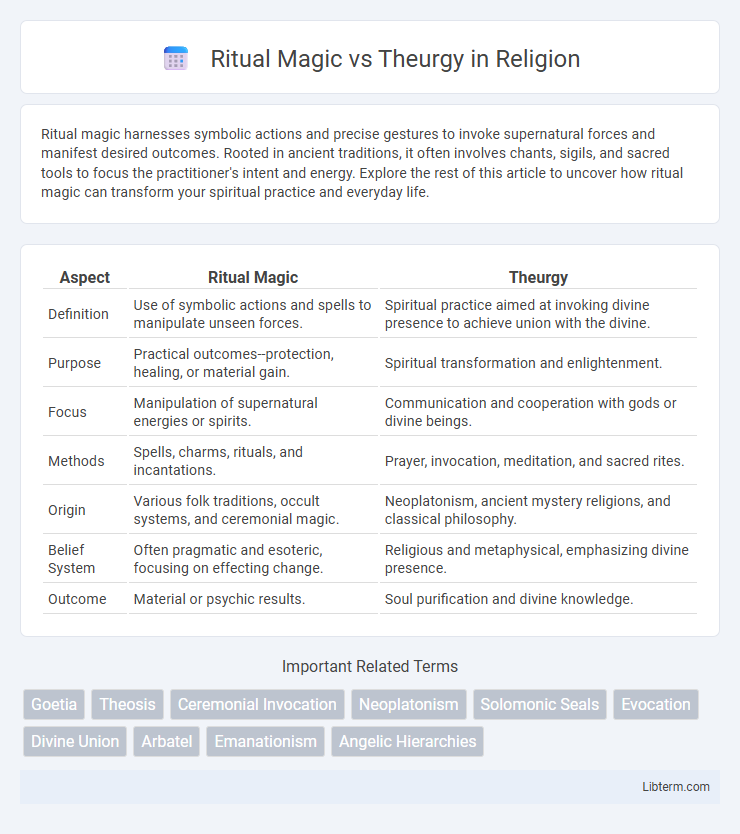Ritual magic harnesses symbolic actions and precise gestures to invoke supernatural forces and manifest desired outcomes. Rooted in ancient traditions, it often involves chants, sigils, and sacred tools to focus the practitioner's intent and energy. Explore the rest of this article to uncover how ritual magic can transform your spiritual practice and everyday life.
Table of Comparison
| Aspect | Ritual Magic | Theurgy |
|---|---|---|
| Definition | Use of symbolic actions and spells to manipulate unseen forces. | Spiritual practice aimed at invoking divine presence to achieve union with the divine. |
| Purpose | Practical outcomes--protection, healing, or material gain. | Spiritual transformation and enlightenment. |
| Focus | Manipulation of supernatural energies or spirits. | Communication and cooperation with gods or divine beings. |
| Methods | Spells, charms, rituals, and incantations. | Prayer, invocation, meditation, and sacred rites. |
| Origin | Various folk traditions, occult systems, and ceremonial magic. | Neoplatonism, ancient mystery religions, and classical philosophy. |
| Belief System | Often pragmatic and esoteric, focusing on effecting change. | Religious and metaphysical, emphasizing divine presence. |
| Outcome | Material or psychic results. | Soul purification and divine knowledge. |
Introduction: Defining Ritual Magic and Theurgy
Ritual Magic involves structured ceremonies and symbolic actions intended to harness supernatural forces for specific goals, often emphasizing personal empowerment or practical outcomes. Theurgy, rooted in Neoplatonic philosophy, aims at spiritual ascent and divine union through sacred rites that invoke higher powers or deities. Both practices use ritualized procedures, but their foundational goals diverge, with Ritual Magic focusing on manipulation of energies and Theurgy prioritizing transcendence and enlightenment.
Historical Origins of Ritual Magic and Theurgy
Ritual Magic traces its origins to ancient Egyptian and Mesopotamian practices, evolving through the Greco-Roman era with influences from Hermeticism and alchemical traditions. Theurgy, rooted in Neoplatonism during the 3rd to 5th centuries CE, was developed by philosophers like Iamblichus who emphasized divine invocation and spiritual ascent. Both systems share symbolic rituals but Theurgy uniquely focuses on uniting the practitioner with divine forces for spiritual transformation.
Philosophical Foundations: Comparing Worldviews
Ritual magic emphasizes manipulating supernatural forces through symbolic acts grounded in animistic or mystical beliefs, often aiming for personal or practical outcomes. Theurgy is rooted in Neoplatonic philosophy, focusing on divine union and spiritual ascent by invoking higher powers to achieve enlightenment and transformation. While ritual magic views the practitioner as an agent influencing external forces, theurgy centers on harmonizing the soul with the cosmos through sacred rites.
Primary Goals: Power vs. Union with the Divine
Ritual magic primarily aims to harness supernatural forces to achieve tangible outcomes such as influence, protection, or material gain through structured ceremonies and spells. Theurgy centers on spiritual ascent and the union with the divine, seeking enlightenment and transformation by invoking higher powers or divine entities. While ritual magic focuses on power acquisition and control, theurgy emphasizes sacred communion and soul purification.
Ritual Structure and Symbolism
Ritual magic emphasizes precise ritual structure, utilizing specific gestures, words, and tools to invoke desired spiritual or supernatural forces, often relying on symbolic correspondences between elements within the ritual circle. Theurgy centers on transformative rites aimed at achieving direct union with divine beings, where symbolism serves to elevate the practitioner's soul, incorporating complex liturgies and prayers that align with theological frameworks. Both practices encode symbolic meaning deeply within their ritual frameworks, but ritual magic prioritizes manipulative control over spiritual energies, whereas theurgy focuses on spiritual enlightenment and divine communion.
Core Practices: Techniques and Tools
Ritual magic primarily employs symbolic tools like wands, chalices, and pentacles to channel energy through structured ceremonies aimed at manifesting specific outcomes. Theurgy emphasizes divine invocation and communion with gods or higher beings, utilizing liturgical prayers, sacred chants, and consecrated objects to foster spiritual transformation and enlightenment. Both practices integrate precise gestures, sacred geometry, and focused intention, but ritual magic targets practical results, whereas theurgy seeks spiritual union.
The Role of Spirits and Deities
In ritual magic, spirits often act as intermediaries or forces manipulated to achieve specific outcomes, while in theurgy, deities are invoked not merely as tools but as sacred presences that facilitate spiritual transformation and union with the divine. Theurgy emphasizes communion with higher powers, seeking enlightenment and divine grace, whereas ritual magic tends to prioritize tangible results through controlling or summoning supernatural entities. This fundamental difference highlights the role of spirits in ritual magic as instruments of power and the role of deities in theurgy as sources of spiritual elevation.
Ethical Considerations and Spiritual Purity
Ritual magic, often centered on manipulation of natural or supernatural forces for personal gain, raises ethical concerns regarding intent and the potential consequences of altering spiritual energies. Theurgy emphasizes aligning with divine will and maintaining spiritual purity through sacred rites aimed at personal transformation and communion with higher powers. Ethical considerations in theurgy stress self-discipline, moral integrity, and respect for cosmic order, contrasting with ritual magic's broader, sometimes ambiguous ethical frameworks.
Influence on Modern Esoteric Traditions
Ritual magic and theurgy both significantly shape modern esoteric traditions, with ritual magic emphasizing practical spellcraft and symbolic acts to influence external forces, while theurgy focuses on spiritual ascent through divine invocation. Contemporary occult systems like Hermeticism and Thelema integrate ritual magic's techniques for manifesting changes in reality, whereas theurgy informs mystical practices aimed at personal transformation and union with higher beings. This dual influence enriches practices such as ceremonial magic, neoplatonism, and modern witchcraft, blending worldly manipulation with spiritual enlightenment.
Conclusion: Distinctions and Contemporary Relevance
Ritual magic emphasizes practical manipulation of supernatural forces for personal or material gain, while theurgy centers on spiritual transformation and union with the divine. Contemporary relevance highlights ritual magic's role in modern occult practices and magic systems, whereas theurgy remains significant in esoteric traditions focused on mystical experience and enlightenment. Understanding these distinctions enriches the study of Western esotericism and its evolving cultural impact.
Ritual Magic Infographic

 libterm.com
libterm.com